- Home
- Stephen Hunter
I Ripper Page 14
I Ripper Read online
Page 14
At exactly this moment, what should arrive but a note from my new friend Professor Thomas Dare. Eager to keep acquaintance with so brilliant a mind and keen a wit, and still hungry for his alluded-to theories of Jack, I tore it open.
“My dear Jeb,” it began. “How pleasant to chat with you at Charlie’s soiree. You may recall the subject of he who is now called ‘The Ripper’ came up. Saucy Jacky, what a fellow. He sells your newspapers, he keeps my mind aflutter.
“But nothing has so moved me as this business of ‘J-U-W-E-S.’ It’s on my foredeck. It’s language. It’s communication. It has a Beneath. Thus I have spent a good part of the last week trying possibilities against the archetype, in hopes of cracking the code.
“I have reached certain conclusions. Being civic-minded when it’s not too much trouble, I went to Scotland Yard and waited three hours to reach an inspector, who listened politely, nodded, then said, ‘Well and good, sir, noted, now if you don’t mind, I’ve other duties,’ and showed me the door. That uninterest I put to Warren, who after all is no policeman, certainly no detective, not even a soldier, but really a kind of engineer. When brick and mortar have to be calculated against the requirements of budget, transport, estimated time of use, repair costs, all for a bridge to be built in Mesopotamia, I suppose he’s the fellow you want, but that’s how he sees the world, nuance-free, unburdened by a Beneath, ultimately quantifiable and measurable. Such silliness won’t catch a devil like Jack.
“In any event, I believe I know what ‘J-U-W-E-S’ is. I’m the only man in London who does, unless I tell you. Would you be interested?
“Yours, Thomas.”
CHAPTER TWENTY-ONE
The Diary
October 15, 1888
* * *
I had to see it, of course. It had been a darkened, even a dream, landscape, in a part of the city I hardly knew. I acted on instinct, boldness, without hesitation, and thus, like Cardigan at Balaclava, my headlong, crazed charge through the enemy phalanxes enabled me to survive for another day’s fight.
I waited, I waited, I waited. Today was long enough after, the air was coolish, the sun bright, and it seemed as good a time as any. I wandered out, seeming merely to take a stroll as might any Londoner, and meandered casually this way and that, though trending toward Mitre Square. Being no fool, I would now and then double around to make certain no one was following, though that felt impossible. Indeed, no one was on to me, I was just another citizen, strolling haphazardly block by block, perhaps on the way to an appointment, a meal, an assignation. Nothing about me was remarkable.
Now and then I passed an apothecary’s, a tobacconist’s, or an out-and-out newstand, where this afternoon’s leader boards blazed away with the latest revelations. It was all old milk, reheated ever so slightly for misleading sale. Jack, Jack, Jack. Jack everywhere, Jack nowhere, Jack spotted in the Thames Tunnel, Jack observed in Hyde Park. Who Jack, where Jack, how Jack, why Jack? When they imagined Jack, I had to laugh. Their Jack was a skulker, a creeper, a lurker who slithered through the fog in a giant topper, with some kind of curving Oriental blade clenched in his fist, held close to his face, which was shielded by the cape he drew tight around his neck with his other hand. His posture was feline, for he moved by cat law, silky, silent, gliding on only toes to ground. Ha and ha again. I was as normal a bloke as you could imagine, nobody but the thrushes saw the blade, which in any case was a straight piece of Sheffield steel, as found in every kitchen in Great Britain. I walked through crowds, shoulders back, head erect, my garb not at all theatricalized along West End variations on cunning evil, and never in my adventures had I glimpsed so much as a wisp of fog. I had a fair, somewhat blocky face, hair of modest attainment, and wouldn’t be caught dead in a top hat. Was I going to a ball after my dates with murder, is that what they thought? Perhaps to Buckingham for tea with the queen? Newspapers: What’s the point of existing if you’re always going to get everything so wrong?
As I got deeper into Whitechapel, the roads clogged up with horse traffic, and the costers’ stalls became obstacles on the sidewalk for pedestrians, all of us squeezing around the choke points, careful not to get shit on our boots or to be crushed by horse tram or beer wagon or speeding hansom. There were dollies out, I suppose, for theirs was a twenty-four-hour-a-day business, men needing notch at any odd stolen hour, but they did not dominate as they did during the evening hours, nor was there the sickly glare of the gaslights and beer shops and public houses to give the place its customary demimonde grotesquerie. It was just business as usual among Brits themselves, the low dregs of empire drawn here, more and more Jews, Indiamen, Teutons, Slavs, and Russkies, so much so that English did not prevail in the constant din of shouts and shills. The overwhelming miasma of the horse deposits that no street sweeper, no matter how energetic, could keep up with, occluded both the nose and the eyes (which wept unavoidably, and who could blame them?), as well as the drifting tang of methane, that other more deadly horse product, headache-inducing if sampled too intensively. The shops, the stalls, the pubs, they fled by in no pattern, as did the various appliances that sustained a horse-drawn economy, troughs, hitching rails, gates leading into yards for the unloading of goods, stables here and there, and the constant noise of the brutes themselves, sometimes a neigh or a whinny, sometimes a cloppity-clop as shoed hoof struck pavement, sometimes the general bluster and sigh of the beasts who basically carried the city on their broad backs without a complaint or a speech. All and all, there was no palpable sign of Jack panic, giving the lie to the conceit that the city was clenched in a fist of fear. Newspapers again, telling a tale that wasn’t.
I passed the Aldgate pump, then Houndsditch and Duke, and there spied the spot where I’d come upon Mrs. Eddowes and put a proposition to her so she’d lead me into the darkness down Mitre Street. When I reached Mitre Street, I turned, finding myself surrounded on either side by low residences undistinguished by anything except that they were sublimely undistinguished. That led, within half a block, to Mitre Square, and on normal days, a lone man entering its portal might attract some suspicion, for what would his business be, but not today, as it still enjoyed its celebrity from my earlier visit.
I cannot say it was packed cheek by jowl like an exhibit at the Great Exposition, but gawkers were all about, most of them clustered in the right-hand corner, near on the wooden yard fence, where Mrs. Eddowes met her fate. I felt no need to approach it and infiltrate the mob just to see a patch of flagstone no different from any other flagstone; instead I took in the whole of the place, seeing in the sun that which had been shrouded in the shadow.
It was a series of brick structures of no particular style or pedigree surrounding for no reason a small patch of space in the middle of a city wilderness. No care, no thought, no wit, most assuredly no brilliance, had gone into its design, if it had indeed been designed, but far more likely, it just happened, as various structures appeared along slipshod principles around it, and someone finally got the idea to crush the wild grass between them under flagstone. Why was it even called a square? Nothing about it suggested the acute angle.
The murder, however, drew many to this otherwise undistinguished lot, and if you guessed the murderer would return to the scene of his crime, you would have been right, I suppose, but at the same time, if you perused the crowd for just such a man, I, the authentic guilty party, would have been the last upon which your eyes would light. Murder has a peculiar odor, and some are drawn to it despite themselves. Many of the people were singles, men mostly but a few ladies as well, all of them unsure how to act, possibly a bit ashamed, but unable to stay away. They stood around stiffly, trying to remain inconspicuous, as if Major Smith and his blue bottles were likely to sweep them up. Nobody made eye contact or really acknowledged each other; out of deference to the newspaper image of Jack under his topper in his opera cape, nobody wore a topper: It was strictly a bowler or slouch hat locality, the clothes all dark and lumpy, as if Mrs. Eddowes would have been insulted by a
splash of color.
I glanced over to the left and saw the church passage from whence I had escaped, and again thanked the God whom I knew did not exist for providing it, copper-free, for that reason alone in His Grand Plan, just as I owed Him for constructing this helpful place so I could improvise brilliantly that night. I meant to leave that way as soon as I got over my disappointment at the prosaic nature of the square and its lack of drama or dynamism in the daylight, but at that point I was discovered.
My guilt was known. It was pointed out. The jig was up. I had returned to the scene and paid the price. All that is true.
It is also true that I was discovered by a dog.
I do not know what higher sensitivities these creatures have, but this one knew. She saw into and through me. She had me, whether by rude particle of blood scent adhering to my flesh (I had meticulously burned all the clothes I wore that night and bathed scrupulously) or some instinctive warning system that highlights predators, or maybe by shrewd analysis of my uninterest in the site of the body for the channel of escape, I know not.
She was a small Scottish West Highland terrier, dead white to proclaim virtue and justice, proving that symbolism of times appears in reality just as readily as it does in fiction, poetry, or art. Her bark was not alarming, but it was insistent; truly heroic, she pulled hard to assault me, plunge her fangs into my flesh, and bring me down.
“Maddy, my goodness, you must stop at once, oh, bad lady, bad bad girl,” yelped her embarrassed master, a grandmotherly type under a straw bonnet with more than a few ribbons, posies, and bows, another murder gawker embarrassed to be stirred into human contact by her doggie’s misbehavior.
But Maddy knew and would not relent. She screamed aloud, “It’s he, it’s Jack, it’s the knifer, the ripper, the killer, oh, you foolish people, if you would but look into this blackguard’s soul, you would see his evil and smell the blood he spilled not thirty feet away!” Unfortunately, since she spoke only terrier, the doltish humans about her paid no attention whatsoever and went about their nervous murder-site gawking.
The mistress bent and scooped up Maddy and hugged the squirming thing to her bosom, but Maddy kept trying to alert civilization to the threat it faced, although to no effect.
“Sir, I am so sorry, I cannot fathom what has got into her today, she is usually so polite.”
“Madam,” I said, “do not be concerned. Dogs, children, and women universally loathe me, but on the other hand, gentlemen do not much care for me, either.”
“Well, sir, at least you’re not a Mason!” said the lady, a rather game riposte, I thought, and it brought our conversation to a pleasing close, as we had chatted in the enjoyable language of high irony. I bent, bowed, removed my bowler in a sweeping, overmagnanimous gesture to signify theatrical-sized graciousness, and turned smartly to abandon the square.
I walked to the church passage, and it was much narrower by day than I recalled by night, with the brick walls pressing in fiercely but a meter or so apart. As I meant to make egress, I turned and saw that the lady had gone back to her ruminating on the events of the square, but Maddy, ever vigilant, had me fixed in a baleful glare.
CHAPTER TWENTY-TWO
Jeb’s Memoir
Was he our Sherlock Holmes? Could the long-hoped-for genius intellect at last be entering the fray? Lord, I did so hope. I also, ambitious wretch, did so hope that I’d be the one to take it all down.
Two days hence I met him at the Reform Club, at Pall Mall next to the Traveler’s Club, in the high club land of central London. His tweeds were magnificent, flowing like the land forms of the heather itself, and again he seemed utterly unimpressed by the figure he cut with his wavy blond hair, his aquiline nose, his round specs, and his general air of Porthos amid the corpses of freshly skewered Richelieu swordsmen.
“Do sit down,” he said, “and pay no attention to the various Irish revolutionaries about you, as they are not apt to plant a bomb in the only place in London where you can have a good dish of lamb stew.”
“As I speak with a wee but insistent Dublin brogue,” I said, “I suspect they would not explode until I left the premises, for fear—misplaced, of course—of blasting one of their own.”
I knew there were no revolutionaries about, not even many radicals, rather that wan and forlorn tribe of misbegotten and guilt-bearing mere liberals, who wanted change at only a slightly increased pace over the progress of a turtle across the Sahara.
We sat in a corner nook of the great cigar- and pipe-smoked room, amid lustrous mahogany walls lined with books and portraits of various liberals from Anne Boleyn on down, and he offered me a cheroot and a drink, the first of which I took, the second of which I turned down.
“Probably a wise decision,” he said. “I have too many times awakened after a night with friend Jack Barley in the arms of a whore whom I promised to marry and thereby render licit. And bourgeois. Believe me, it takes more than phonetics to get out of that one with phiz intact.”
I laughed, loving again a wit based on shock, which I had not encountered in so pure a form. Perhaps Wilde had it in him, for his was also a sharpness of the knife as applied to moral convention (and how, as it turned out, poor man!). I wondered then, as I do now, if Wilde knew Dare and borrowed from him. I knew I would borrow from Dare. And I certainly have!
“So,” he said, “the Irish journalist who’s really a music critic wants a solution to the mystery of J-U-W-E, does he?”
“I’ve read and heard so many, I yearn for a thing I can believe in.”
“Not for you, then, satanic or Masonic ritual, ancient cockney slang, the ravings of a ill-educated lout who cannot spell a three-letter word and would, if challenged, produce C-A-E-T for cat? Are there others?”
“Some seem to think it Chinese. Or rather the pronunciation of a Chinese pictogram. Others place its derivation in the steppes, where Russia runs out and tribal Cossack elements begin. Language, most agree, is at the heart of it.”
“I do, too. Indeed, it is language.”
He reached into a briefcase I had not noticed and pulled out a volume, not a book but more than a newspaper, a kind of heavily bound journal of the sort I would later learn was a part of medical and scientific worlds.
“Here is your answer,” he said, “and congratulations on being the second man in London to behold it.”
I took it eagerly.
“Pages 132 through 139,” he said helpfully.
Alas, they were in German, as was the whole damned thing.
“Sir, I have no German.”
“Why, you have been advertised to me as a sort of genius.”
“I have taught myself Pitman shorthand and am able to read French, which I taught myself as well. I am known as a wit and have some potential as a writer. But that is where it stops, alas.”
“All right, then. The journal you have before you is Zeitschrift fur vergleichende Augenheilkunde. Which playfully translates into the ‘Journal of Comparative Ophthamology.’ On the pages specified, a brilliant German opthamalogist—that is, eye doctor—named Rudolf Berlin has published a study entitled Eine besondere Art der Worthblindheit (Dyslexie). Does that clear things up a bit for you?”
He was playing with me as a cat plays with a mouse. But he wasn’t meaning to eat me—rather, to enlighten me. To do so, he had to destroy me. Thus is education built.
“You know it hasn’t, sir,” I said.
“I think rather too much of myself, don’t I? I find myself so amusing. Always had that problem. All right, then, Herr Doktor Berlin’s title translates as ‘A Special Kind of Word Blindness,’ and in parentheses he has coined a term for a condition relevant to our inquiry here.”
“And that is—”
“This condition posits an interference between what the eye records and what the brain receives. He called it dyslexie, or in our more felicitous tongue, dyslexia.”
“You’re saying—” I was struggling with the concept.
“I am saying Jack has
a condition known not as stupidity or insanity or immorality or even cannibalism, but while he may indeed have all those, his condition is scientifically called dyslexia. He is dyslexic.”
I nodded, even if my eyes were occluded with confusion.
“Put simply: He looks at the letters J-E-W-S and that is what he sees, but as his eyes send that information brainward, they become, by tangled paths not yet understood, J-U-W-E-S. To him, J-U-W-E-S is objective reality. He has no idea he’s ‘misspelling,’ though assuming that he’s mature, he’s presumably aware that he has certain spelling and reading problems, but as no diagnosis for his condition existed until last year, he has spent his life quietly devising strategies to get around it. His friends, his family, his society, none of them has any idea he has this condition because he has gotten so damned good at hiding it. But it tells us certain things. For example, he is certain not to have a job in any firm or institution that demands carefully written reports, which lets out most forms of science, medicine being one. There goes the mad-surgeon theory. His infirmity would hold him back, even make him a laughingstock. He must therefore be in some action- or behavior-intensive line of work, such as policeman or soldier, perhaps a surveyor, or an architect. His form of the condition may not at all affect his acuity with numbers or images, so he could be an engineer, a retailer, a manufacturer, what have you. He might be very gifted in verbal expression, and thus a barrister, a sales representative, a stockbroker, a carnival barker.

 Point of Impact
Point of Impact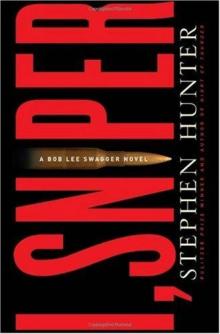 I, Sniper
I, Sniper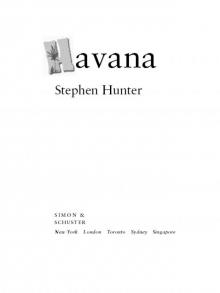 Havana
Havana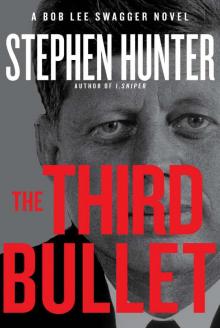 The Third Bullet
The Third Bullet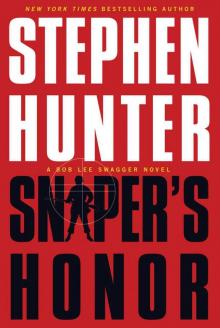 Sniper's Honor: A Bob Lee Swagger Novel
Sniper's Honor: A Bob Lee Swagger Novel Dirty White Boys
Dirty White Boys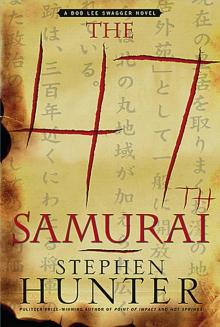 The 47th Samurai
The 47th Samurai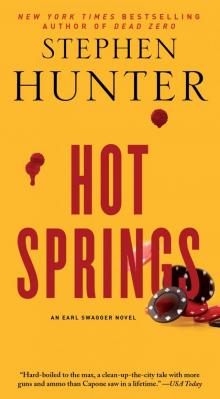 Hot Springs
Hot Springs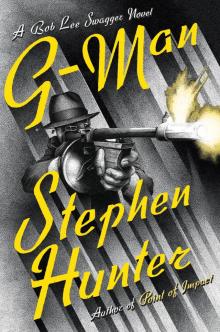 G-Man
G-Man Black Light
Black Light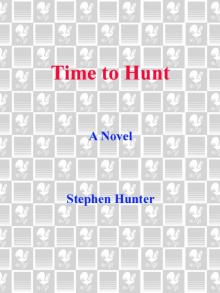 Time to Hunt
Time to Hunt The Day Before Midnight
The Day Before Midnight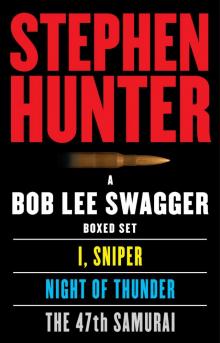 A Bob Lee Swagger Boxed Set
A Bob Lee Swagger Boxed Set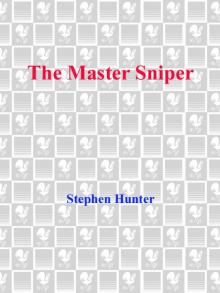 The Master Sniper
The Master Sniper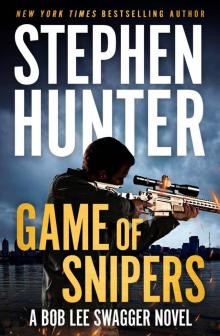 Game of Snipers
Game of Snipers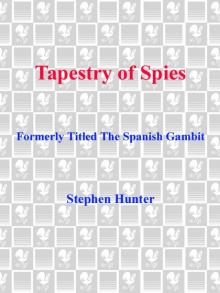 Tapestry of Spies
Tapestry of Spies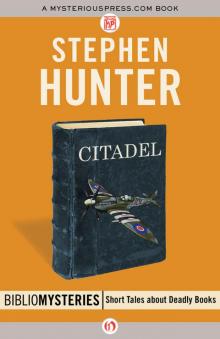 Citadel
Citadel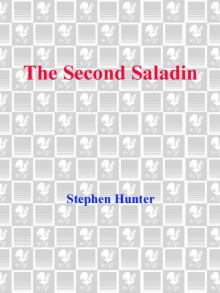 The Second Saladin
The Second Saladin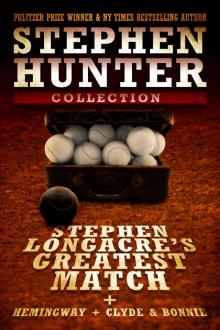 Stephen Longacre's Greatest Match
Stephen Longacre's Greatest Match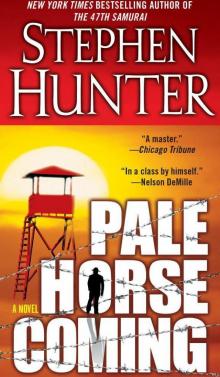 Pale Horse Coming
Pale Horse Coming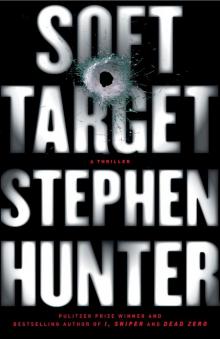 Soft Target
Soft Target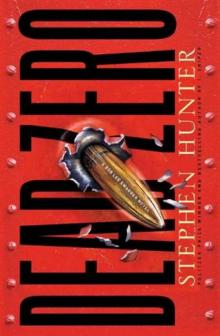 Dead Zero
Dead Zero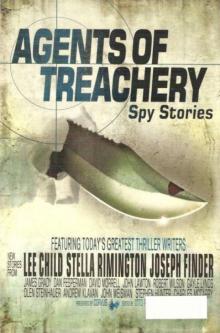 Casey at the Bat
Casey at the Bat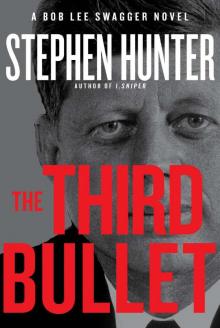 The Third Bullet bls-8
The Third Bullet bls-8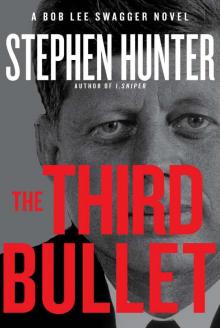 The Third Bullet: A Bob Lee Swagger Novel
The Third Bullet: A Bob Lee Swagger Novel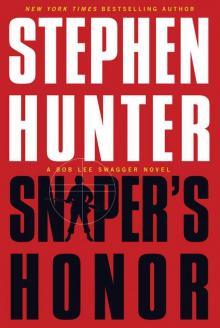 Sniper's Honor
Sniper's Honor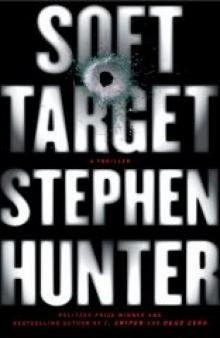 Soft target rc-1
Soft target rc-1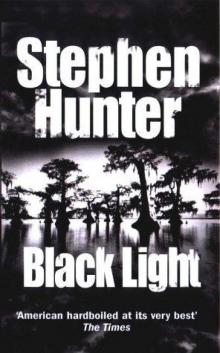 Black Light bls-2
Black Light bls-2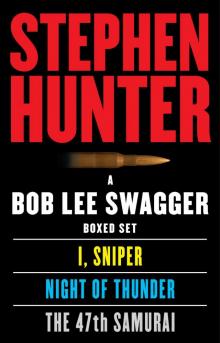 A Bob Lee Swagger eBook Boxed Set: I, Sniper, Night of Thunder, 47th Samurai
A Bob Lee Swagger eBook Boxed Set: I, Sniper, Night of Thunder, 47th Samurai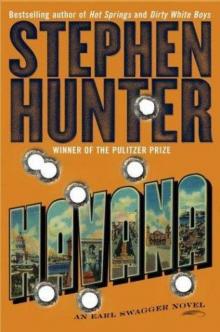 Havana es-3
Havana es-3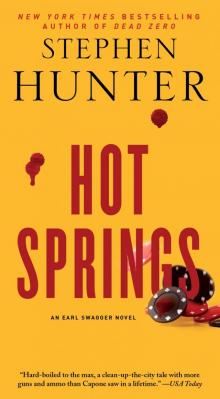 Hot Springs (Earl Swagger)
Hot Springs (Earl Swagger)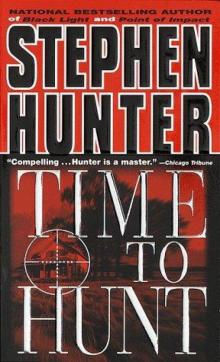 Time to Hunt bls-1
Time to Hunt bls-1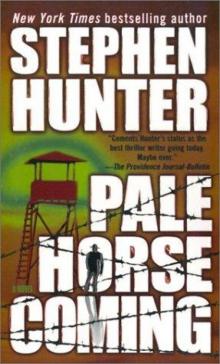 Pale Horse Coming es-2
Pale Horse Coming es-2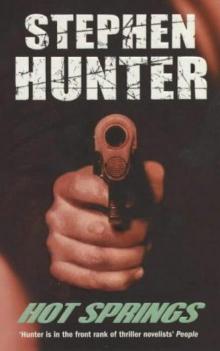 Hot Springs es-1
Hot Springs es-1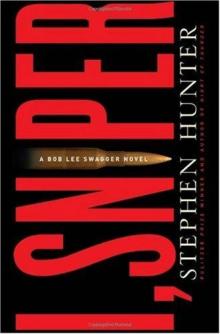 I, Sniper: A Bob Lee Swagger Novel
I, Sniper: A Bob Lee Swagger Novel